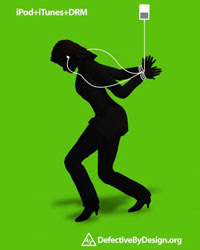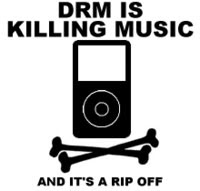 I bought some music the other day and I felt like a chump. I could have downloaded it, with ease, for free, but I didn’t. I could have bought it for less online, but I didn’t. I purchased the full price, CD version and people looked at me like I was crazy.
I bought some music the other day and I felt like a chump. I could have downloaded it, with ease, for free, but I didn’t. I could have bought it for less online, but I didn’t. I purchased the full price, CD version and people looked at me like I was crazy.Why not get it free? It’s out there at the click of a button. You can get the single, the album, or the entire discography in a zip file, but I just can’t bring myself to do it. If the variety store at the end of the street had bags of chips sitting out that I could take whenever I wanted I wouldn’t do it, and I really, really love chips. (Mmmm, salt and vinegar) Just because you can, doesn’t mean you should. Now I’m no saint – I’ve got my share of illegal downloads. I sample bands I’ve never heard of to find out if I’d like them, but if I get more than a few songs I go get the album. I’ve also picked up some music that I already own, but not in a digital format.
So why not pick it up from an authorized digital retailer like iTunes or Puretracks? The short answer is DRM: Digital Rights Management or Digital Restrictions Management if you’re not so hot on the technology. Count me in the latter group. When you buy music on the web, you are essentially renting the tunes. There are restrictions on copying, where they can be played and how often they can be shared. Compare that to the CD, which I can play wherever, copy as many times as I like and is still even after a hard drive meltdown. Sure, you can find ways around the DRM, but then you’re right back at the filching music conundrum.
 And who does DRM restrict? Anybody who wants to get the music for free can – it only penalizes those who actually decide to pay. But now there is an unlikely ally who also doesn’t think much of DRM either – Apple CEO Steve Jobs, whose company is the creator of the almighty iPod and dominates the legal download market. Last week Jobs called on the major labels to drop DRM altogether.
And who does DRM restrict? Anybody who wants to get the music for free can – it only penalizes those who actually decide to pay. But now there is an unlikely ally who also doesn’t think much of DRM either – Apple CEO Steve Jobs, whose company is the creator of the almighty iPod and dominates the legal download market. Last week Jobs called on the major labels to drop DRM altogether."Imagine a world where every online store sells DRM-free music encoded in open licensable formats. In such a world, any player can play music purchased from any store, and any store can sell music which is playable on all players. This is clearly the best alternative for consumers, and Apple would embrace it in a heartbeat,” wrote Jobs. “If the big four music companies would license Apple their music without the requirement that it be protected with a DRM, we would switch to selling only DRM-free music on our iTunes store."
Will the labels heed the call? Not any time soon. Warner Music CEO Edgar Bronfman called Job’s suggestion “completely without logic or merit” while EMI is mulling over the idea. Dropping DRM won’t solve all the industries ills, but it will at least be a step towards treating music fans like criminals. Then they can get to work on a perpetual content license so I don’t have to keep buying music that I’ve already bought a couple of times.










Some Cds you can copy whenever you want. Some you cannot. In fact, some of the new EMI CDs will not even transfer to iTunes. So, I own CDs that I cannot listen to on my iPod. Grrr.
ReplyDeleteGreat post and Paul and I share the same heartache.
ReplyDeleteWhen Sony/BMG released their much-derided DRM for CDs a bunch of them wouldn't work on my PC at work - they would play, but with intermittent black space that made it unlistenable. But when I brought them home and ripped them to my Mac, they worked fine. One of the benefits of using a tech that most don't bother to program for.
ReplyDeleteOf course if it hadn't worked, I would have had no qualms at all of going and downloading the songs from a peer-to-peer site. It's not like I would have been taking anything I didn't already own.
I've done the same, Jeremy. I downloaded several tracks from a recent Nickleback CD that I bought, but couldn't rip to my computer. As far as I'm concerned, there's nothing illegal about that. I paid for the music, I just want to listen to it on a portable device.
ReplyDeleteOne big drawback with DRM is that if you lose your licences, you can't play your songs any more. I had a PC crash this last spring. Napster customer service was great in letting me know how to get my lost licences. On the other hand, I got absolutely no response from WalMart. As a result, I lost quite a few songs simply because I didn't have the licences for them any more. Fortunately, the vast majority of music I got was through Napster.
ReplyDeleteI didn't know about the Jobs thing. He's such a weird guy. You never know what he'll say.
ReplyDeleteI love the 'killing music' graphic. When did the original 'home taping is killing music' stickers first start popping up, like the early 80s? I wonder if people will still be joking about it in another 20 years?